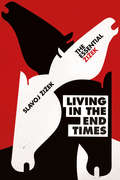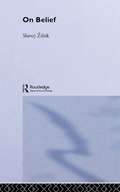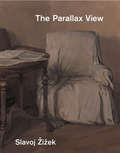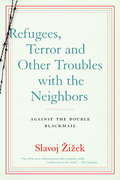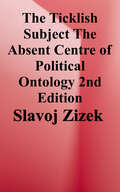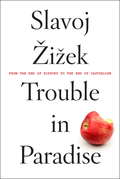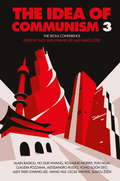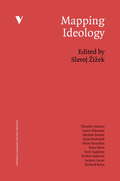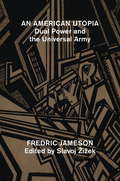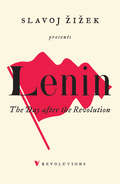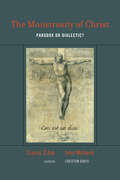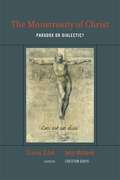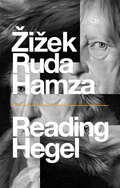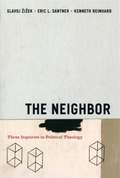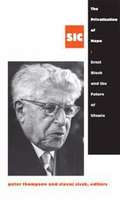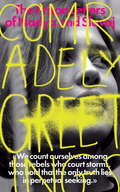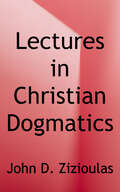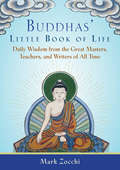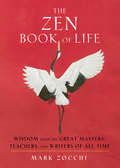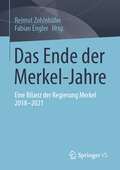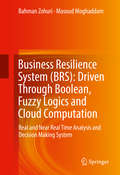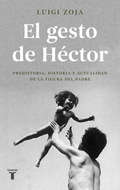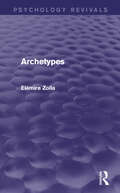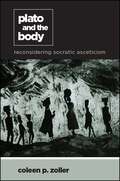- Table View
- List View
Living in the End Times
by Slavoj ZizekThe underlying premise of the book is a simple one: the global capitalist system is approaching an apocalyptic zero-point. Its four riders of the apocalypse are the ecological crisis, the consequences of the biogenetic revolution, the imbalances within the system itself (problems with intellectual property, the forthcoming struggle for raw materials, food and water), and the explosions of social divisions and exclusions. Society's first reaction is ideological denial, then explosions of anger at the injustices of the new world order, attempts at bargaining, and when this fails, depression and withdrawal set in. Finally, after passing through this zero-point we no longer perceive it as a threat, but as the chance for a new beginning. or, as Mao Zedong might have put it, "There is great disorder under heaven, the situation is excellent." i ek traces out in detail these five stances, makes a plea for a return to the Marxian critique of political economy, and sniffs out the first signs of a budding communist culture in all its diverse forms--in utopias that range from Kafka's community of mice to the collective of freak outcasts in the TV series Heroes.
On Belief (Thinking in Action)
by Slavoj ZizekWhat is the basis of belief in an era when globalization, multiculturalism and big business are the new religion? Slavoj Zizek, renowned philosopher and irrepressible cultural critic takes on all comers in this compelling and breathless new book.From 'cyberspace reason' to the paradox that is 'Western Buddhism', On Belief gets behind the contours of the way we normally think about belief, in particular Judaism and Christianity. Holding up the so-called authenticity of religious belief to critical light, Zizek draws on psychoanalysis, film and philosophy to reveal in startling fashion that nothing could be worse for believers than their beliefs turning out to be true.
The Parallax View (Short Circuits)
by Slavoj ZizekIn Žižek's long-awaited magnum opus, he theorizes the "parallax gap" in the ontological, the scientific, and the political—and rehabilitates dialectical materialism. The Parallax View is Slavoj Žižek's most substantial theoretical work to appear in many years; Žižek himself describes it as his magnum opus. Parallax can be defined as the apparent displacement of an object, caused by a change in observational position. Žižek is interested in the "parallax gap" separating two points between which no synthesis or mediation is possible, linked by an "impossible short circuit" of levels that can never meet. From this consideration of parallax, Žižek begins a rehabilitation of dialectical materialism. Modes of parallax can be seen in different domains of today's theory, from the wave-particle duality in quantum physics to the parallax of the unconscious in Freudian psychoanalysis between interpretations of the formation of the unconscious and theories of drives. In The Parallax View, Žižek, with his usual astonishing erudition, focuses on three main modes of parallax: the ontological difference, the ultimate parallax that conditions our very access to reality; the scientific parallax, the irreducible gap between the phenomenal experience of reality and its scientific explanation, which reaches its apogee in today's brain sciences (according to which "nobody is home" in the skull, just stacks of brain meat—a condition Žižek calls "the unbearable lightness of being no one"); and the political parallax, the social antagonism that allows for no common ground. Between his discussions of these three modes, Žižek offers interludes that deal with more specific topics—including an ethical act in a novel by Henry James and anti-anti-Semitism. The Parallax View not only expands Žižek's Lacanian-Hegelian approach to new domains (notably cognitive brain sciences) but also provides the systematic exposition of the conceptual framework that underlies his entire work. Philosophical and theological analysis, detailed readings of literature, cinema, and music coexist with lively anecdotes and obscene jokes.
Refugees, Terror and Other Troubles with the Neighbors: Against the Double Blackmail
by Slavoj ZizekCalled "the Elvis of cultural theory" by The New York Times, popular philosopher and leftist rabble-rouser Slavoj Zizek, looks at one of the most desperate situations of our time: the current refugee crisis overwhelming Europe. In this short yet stirring book, Zizek argues that accepting all comers or blocking all entry are both untenable solutions... but there is a third option.Today, hundreds of thousands of people, desperate to escape war, violence and poverty, are crossing the Mediterranean to seek refuge in Europe. Our response, from our protected Western European standpoint, argues Slavoj Zizek, offers two versions of ideological blackmail: either we open our doors as widely as possible; or we try to pull up the drawbridge. Both solutions are bad, states Zizek. They merely prolong the problem, rather than tackling it.The refugee crisis also presents an opportunity, a unique chance for Europe to redefine itself: but, if we are to do so, we have to start raising unpleasant and difficult questions. We must also acknowledge that large migrations are our future: only then can we commit to a carefully prepared process of change, one founded not on a community that see the excluded as a threat, but one that takes as its basis the shared substance of our social being.The only way, in other words, to get to the heart of one of the greatest issues confronting Europe today is to insist on the global solidarity of the exploited and oppressed. Maybe such solidarity is a utopia. But, warns Zizek, if we don't engage in it, then we are really lost. And we will deserve to be lost.
The Ticklish Subject: The Absent Centre of Political Ontology (The Essential Zizek Series)
by Slavoj ZizekSlavoj Zizek, the maverick philosopher, author of over 30 books, acclaimed as the "Elvis of cultural theory", and today's most controversial public intellectual. His work traverses the fields of philosophy, psychoanalysis, theology, history and political theory, taking in film, popular culture, literature and jokes--all to provide acute analyses of the complexities of contemporary ideology as well as a serious and sophisticated philosophy. His recent films The Pervert's Guide to the Cinema and Zizek! reveal a theorist at the peak of his powers and a skilled communicator. <p><p>Now Verso is making his classic titles, each of which stand as a core of his ever-expanding life's work, available as new editions. Each is beautifully re-packaged, including new introductions from Zizek himself. Simply put, they are the essential texts for understanding Zizek's thought and thus cornerstones of contemporary philosophy. <p><p>The Ticklish Subject: The Absent Centre of Political Ontology: A specter is haunting Western thought, the specter of the Cartesian subject. In this book Slavoj Zizek unearths a subversive core to this elusive specter, and finds within it the indispensable philosophical point of reference for any genuinely emancipatory project.
Trouble in Paradise
by Slavoj ZizekIn Trouble in Paradise, Slavoj i ek, one of our most famous, most combative philosophers, explains how we can find a way out of the crisis of capitalism. There is obviously trouble in the global capitalist paradise. But why do we find it so difficult to imagine a way out of the crisis we're in? It is as if the trouble feeds on itself: the march of capitalism has become inexorable, the only game in town. Setting out to diagnose the condition of global capitalism, the ideological constraints we are faced with in our daily lives, and the bleak future promised by this system, Slavoj i ek explores the possibilities--and the traps--of new emancipatory struggles. Drawing insights from phenomena as diverse as "Gangnam Style" to Marx, The Dark Knight to Thatcher, Trouble in Paradise is an incisive dissection of the world we inhabit, and the new order to come.From the Hardcover edition.
The Idea of Communism 3: The Seoul Conference
by Slavoj Zizek Alex Taek-Gwang LeeAn all-star cast of radical intellectuals discuss the continued importance of communist principlesIn 2009 Slavoj i ek brought together an acclaimed group of intellectuals to discuss the continued relevance of communism. Unexpectedly the conference attracted an audience of over 1,000 people. The discussion has continued across the world and this book gathers responses from the conference in Seoul. It includes the interventions of regular contributors Alain Badiou and Slavoj i ek, as well as work from across Asia, notably from Chinese scholar Wang Hui, offering regional perspectives on communism in an era of global economic crisis and political upheaval.From the Trade Paperback edition.
Mapping Ideology
by Slavoj Zizek Michele Barrett Theodor Adorno Louis Althusser Nicholas AbercrombieFor a long time, the term "ideology" was in disrepute, having become associated with such unfashionable notions as fundamental truth and the eternal verities. The tide has turned, and recent years have seen a revival of interest in the questions that ideology poses to social and cultural theory and to political practice.Including Slavoj i ek's study of the development of the concept from Marx to the present, assessments of the contributions of Lukács and the Frankfurt School by Terry Eagleton, Peter Dews and Seyla Benhabib, and essays by Adorno, Lacan and Althusser, Mapping Ideology is an invaluable guide to the most dynamic field in cultural theory.
An American Utopia: Dual Power and the Universal Army
by Slavoj Zizek Fredric JamesonControversial manifesto by acclaimed cultural theorist debated by leading writers Fredric Jameson's pathbreaking essay "An American Utopia" radically questions standard leftist notions of what constitutes an emancipated society. Advocated here are--among other things--universal conscription, the full acknowledgment of envy and resentment as a fundamental challenge to any communist society, and the acceptance that the division between work and leisure cannot be overcome. To create a new world, we must first change the way we envision the world. Jameson's text is ideally placed to trigger a debate on the alternatives to global capitalism. In addition to Jameson's essay, the volume includes responses from philosophers and political and cultural analysts, as well as an epilogue from Jameson himself. Many will be appalled at what they will encounter in these pages--there will be blood! But perhaps one has to spill such (ideological) blood to give the Left a chance. Contributing are Kim Stanley Robinson, Jodi Dean, Saroj Giri, Agon Hamza, Kojin Karatani, Frank Ruda, Alberto Toscano, Kathi Weeks, and Slavoj i ek.From the Trade Paperback edition.
Lenin 2017: Remembering, Repeating, and Working Through
by Slavoj Zizek V. I. LeninOne hundred years after the Russian Revolution, i ek shows why Lenin’s thought is still important todayLenin’s originality and importance as a revolutionary leader is most often associated with the seizure of power in 1917. But, i ek argues in this new study and collection of original texts, Lenin’s true greatness can be better grasped in the very last couple of years of his political life. Russia had survived foreign invasion, embargo and a terrifying civil war, as well as internal revolts such as at Kronstadt in 1921. But the new state was exhausted, isolated and disorientated in the face of the world revolution that seemed to be receding. New paths had to be sought, almost from scratch, for the Soviet state to survive and imagine some alternative route to the future. With his characteristic brio and provocative insight, i ek suggests that Lenin’s courage as a thinker can be found in his willingness to face this reality of retreat lucidly and frontally.From the Hardcover edition.
The Monstrosity of Christ: Paradox or Dialectic? (Short Circuits)
by Slavoj Zizek John MilbankA militant Marxist atheist and a “Radical Orthodox” Christian theologian square off on everything from the meaning of theology and Christ to the war machine of corporate mafia. In this corner, philosopher Slavoj Žižek, a militant atheist who represents the critical-materialist stance against religion's illusions; in the other corner, “Radical Orthodox” theologian John Milbank, an influential and provocative thinker who argues that theology is the only foundation upon which knowledge, politics, and ethics can stand. In The Monstrosity of Christ, Žižek and Milbank go head to head for three rounds, employing an impressive arsenal of moves to advance their positions and press their respective advantages. By the closing bell, they have not only proven themselves worthy adversaries, they have shown that faith and reason are not simply and intractably opposed. Žižek has long been interested in the emancipatory potential offered by Christian theology. And Milbank, seeing global capitalism as the new century's greatest ethical challenge, has pushed his own ontology in more political and materialist directions. Their debate in The Monstrosity of Christ concerns the future of religion, secularity, and political hope in light of a monsterful event—God becoming human. For the first time since Žižek's turn toward theology, we have a true debate between an atheist and a theologian about the very meaning of theology, Christ, the Church, the Holy Ghost, Universality, and the foundations of logic. The result goes far beyond the popularized atheist/theist point/counterpoint of recent books by Christopher Hitchens, Richard Dawkins, and others. Žižek begins, and Milbank answers, countering dialectics with “paradox.” The debate centers on the nature of and relation between paradox and parallax, between analogy and dialectics, between transcendent glory and liberation. Slavoj Žižek is a philosopher and cultural critic. He has published over thirty books, including Looking Awry, The Puppet and the Dwarf, and The Parallax View (these three published by the MIT Press). John Milbank is an influential Christian theologian and the author of Theology and Social Theory: Beyond Secular Reason and other books. Creston Davis, who conceived of this encounter, studied under both Žižek and Milbank.
The Monstrosity of Christ: Paradox or Dialectic?
by Slavoj Zizek John Milbank Creston DavisIf the theological was marginalized in the age of Western secular modernity, it has now returned with a vengeance. Theology is reconfiguring the very makeup of the humanities in general, with disciplines like philosophy, political science, literature, history, psychoanalysis, and critical theory, in particular, feeling the impact of this return.
Reading Hegel
by Slavoj Zizek Frank Ruda Agon HamzaA spirit is haunting contemporary thought – the spirit of Hegel. All the powers of academia have entered into a holy alliance to exorcize this spirit: Vitalists and Eschatologists, Transcendental Pragmatists and Speculative Realists, Historical Materialists and even ‘liberal Hegelians’. Which of these groups has not been denounced as metaphysically Hegelian by its opponents? And which has not hurled back the branding reproach of Hegelian metaphysics in its turn? Progressives, liberals and reactionaries alike receive this condemnation. In light of this situation, it is high time that true Hegelians should openly admit their allegiance and, without obfuscation, express the importance and validity of Hegelianism to the contemporary intellectual scene. To this end, a small group of Hegelians of different nationalities have assembled to sketch the following book – a book which addresses a number of pressing issues that a contemporary reading of Hegel allows a new perspective on: our relation to the future, our relation to nature and our relation to the absolute.
The Neighbor: Three Inquiries in Political Theology
by Slavoj Zizek Eric L. Santner Kenneth ReinhardIn Civilization and Its Discontents, Freud made abundantly clear what he thought about the biblical injunction, first articulated in Leviticus 19:18 and then elaborated in Christian teachings, to love one's neighbor as oneself. "Let us adopt a naive attitude towards it," he proposed, "as though we were hearing it for the first time; we shall be unable then to suppress a feeling of surprise and bewilderment." In The Neighbor, three of the most significant intellectuals working in psychoanalysis and critical theory collaborate to show how this problem of neighbor-love opens questions that are fundamental to ethical inquiry and that suggest a new theological configuration of political theory.
The Privatization of Hope: Ernst Bloch and the Future of Utopia, SIC 8
by Slavoj Zizek Peter ThompsonThe concept of hope is central to the work of the German philosopher Ernst Bloch (1885-1977), especially in his magnum opus, The Principle of Hope (1959). The "speculative materialism" that he first developed in the 1930s asserts a commitment to humanity's potential that continued through his later work. In The Privatization of Hope, leading thinkers in utopian studies explore the insights that Bloch's ideas provide in understanding the present. Mired in the excesses and disaffections of contemporary capitalist society, hope in the Blochian sense has become atomized, desocialized, and privatized. From myriad perspectives, the contributors clearly delineate the renewed value of Bloch's theories in this age of hopelessness. Bringing Bloch's "ontology of Not Yet Being" into conversation with twenty-first-century concerns, this collection is intended to help revive and revitalize philosophy's commitment to the generative force of hope.Contributors. Roland Boer, Frances Daly, Henk de Berg, Vincent Geoghegan, Wayne Hudson, Ruth Levitas, David Miller, Catherine Moir, Caitríona Ní Dhúill, Welf Schröter, Johan Siebers, Peter Thompson, Francesca Vidal, Rainer Ernst Zimmermann, Slavoj Žižek
Comradely Greetings
by Slavoj Zizek Nadezhda Tololonnikova"We are the rebels asking for the storm, and believing that truth is only to be found in an endless search ... Two years of prison for Pussy Riot is our tribute to a destiny that gave us sharp ears, allowing us to sound the note A when everyone else is used to hearing G flat."In an extraordinary exchange of letters, Nadezhda Tolokonnikova, imprisoned for taking part in Pussy Riot's anti-Putin performance, and Slovenian philosopher Slavoj i ek discuss artistic subversion, political activism, and the future of democracy via the ideas of Hegel, Deleuze, Nietzsche, and even Laurie Anderson. Two radicals, one in a Russian forced labor camp, the other writing to her from far outside its walls, show passionately - across linguistic and generational divides - that "there is still a common cause worth fighting for." Touching, erudite, and worldly, their correspondence unfolds with poetic urgency.In association with Philosophie Magazine. From the Trade Paperback edition.
Lectures in Christian Dogmatics
by John D. ZizioulasIn this series of lectures on of the most eminent Christian theologians of our time, Metropolitan John Zizioulas, give his account of the fundamental teachings of Christian theology. <p><p>He presents Christian doctrine as a comprehensive account of the freedom that results from relationship with God. The whole lecture series lays out complex ideas with the utmost simplicity, illustrates the grandeur of Christian teaching, and is a profound exploration of freedom.
Buddhas' Little Book of Life: Daily Wisdom from the Great Masters, Teachers, and Writers of All Time
by Mark ZocchiInspired by teachings of the Buddha, great masters, teachers, and writers, this is a book designed to help people connect to their inner divinity and find their spiritual path. It is overflowing with profound quotes, sayings, and insights, each presented on its own to allow the reader to dip in randomly and consider one insight at a time. Each reading is guaranteed to immediately inspire or provide food for thought. <P><P>The quotations and sayings have been chosen from Gautama Buddha and other masters of spirituality and inspiration, such as Milarepa, Longchenpa, his Holiness the 14th Dalai Lama, Thich Nhat Hanh, Sogyal Rinpoche, and other greats such as Cicero, Rumi, Lao Tzu, Mother Teresa, and Shakespeare. <P><P>This book is designed to live on your desk, coffee table, or nightstand to provide you with daily comfort, wisdom, and spiritual nourishment. <P><P>“When my house burned down, I gained an unobstructed view of the moon.” —Zen <P><P>“There is no master, there is no instructor, there is no person to tell you what you must do.” —Krishnamurti <P><P>“To abandon what is harmful To adopt what is wholesome To purify the heart and mind: This is the teaching of the Buddha.” —Buddha
The Zen Book of Life: Wisdom from the Great Masters, Teachers, and Writers of All Time
by Mark ZocchiInspired by the teachings of the Buddha and other great masters, teachers, and writers, this is a book designed to help people connect to their inner divinity and find their spiritual path. It is overflowing with profound quotes, sayings, and insights, each presented alone, allowing the reader to dip in at any time. Each reading is guaranteed to inspire immediately and provide food for thought.Quotations and sayings have been chosen from Gautama Buddha and other "buddhas"--masters of spirituality and inspiration, such as Milarepa, Longchenpa, his Holiness the 14th Dali Lama, Thich Nhat Hanh, and Sogyal Rinpoche, along with other "greats" including Cicero, Rumi, Lao Tzu, Mother Teresa, and Shakespeare. <P><P>A wonderful book to place on your office desk, coffee table, or bookshelf or by your bed, it is designed to provide daily comfort, wisdom, and spiritual nourishment.
What's Alive? (Let's-Read-and-Find-Out Science 1)
by Kathleen Weidner ZoehfeldRead and find out about what makes something alive, and what all living things need to stay healthy, in this colorfully illustrated nonfiction picture book.A person and a cat have something in common: You are both alive. People and plants and animals are all alive, but is a doll alive? Or your bike? How can you tell?This is a clear and appealing science book for early elementary age kids, both at home and in the classroom. It's a Level 1 Let's-Read-and-Find-Out, which means the book explores introductory concepts perfect for children in the primary grades. The 100+ titles in this leading nonfiction series are:hands-on and visualacclaimed and trustedgreat for classroomsTop 10 reasons to love LRFOs:Entertain and educate at the same timeHave appealing, child-centered topicsDevelopmentally appropriate for emerging readersFocused; answering questions instead of using survey approachEmploy engaging picture book quality illustrationsUse simple charts and graphics to improve visual literacy skillsFeature hands-on activities to engage young scientistsMeet national science education standardsWritten/illustrated by award-winning authors/illustrators & vetted by an expert in the fieldOver 130 titles in print, meeting a wide range of kids' scientific interestsBooks in this series support the Common Core Learning Standards, Next Generation Science Standards, and the Science, Technology, Engineering, and Math (STEM) standards. Let's-Read-and-Find-Out is the winner of the American Association for the Advancement of Science/Subaru Science Books & Films Prize for Outstanding Science Series.
Das Ende der Merkel-Jahre: Eine Bilanz der Regierung Merkel 2018-2021
by Reimut Zohlnhöfer Fabian EnglerDer Sammelband zieht eine erste und zugleich umfassende politikwissenschaftliche Bilanz der vierten Regierung Merkel aus CDU/CSU und SPD. In den Beiträgen ausgewiesener Expert*innen werden in einem ersten Teil die Rahmenbedingungen des Regierens durch die Große Koalition zwischen 2017/18 und 2021 analysiert. Hierzu zählen die strategische Positionierung von Regierungs- und Oppositionsparteien, das Koalitionsmanagement, die Koordination der Bundesländer sowie das Abstimmungsverhalten im Bundestag. In einem zweiten Teil wird das Regierungshandeln in allen relevanten Politikfeldern beschrieben, erklärt und bewertet. Hierzu zählt nicht nur die in der zweiten Hälfte der Legislaturperiode alles dominierende Corona-Krisenpolitik. Vielmehr werden auch die wichtigsten Entscheidungen und Nicht-Entscheidungen in Bereichen wie der Finanz- und Sozialpolitik, der Umweltpolitik, der Integrationspolitik oder der Außen- und Europapolitik untersucht und eingeordnet.
Business Resilience System (BRS) (BRS): Real and Near Real Time Analysis and Decision Making System
by Bahman Zohuri Masoud MoghaddamThis book provides a technical approach to a Business Resilience System with its Risk Atom and Processing Data Point based on fuzzy logic and cloud computation in real time. Its purpose and objectives define a clear set of expectations for Organizations and Enterprises so their network system and supply chain are totally resilient and protected against cyber-attacks, manmade threats, and natural disasters. These enterprises include financial, organizational, homeland security, and supply chain operations with multi-point manufacturing across the world. Market shares and marketing advantages are expected to result from the implementation of the system. The collected information and defined objectives form the basis to monitor and analyze the data through cloud computation, and will guarantee the success of their survivability's against any unexpected threats. This book will be useful for advanced undergraduate and graduate students in the field of computer engineering, engineers that work for manufacturing companies, business analysts in retail and e-Commerce, and those working in the defense industry, Information Security, and Information Technology.
El gesto de Héctor: Prehistoria, historia y actualidad de la figura del padre
by Luigi Zoja«Héctor se quita el casco, lo pone en el suelo y puede abrazar al niño. Formulando un deseo para el futuro, eleva a su hijo hacia lo alto con los brazos y con el pensamiento. Este gesto será, para siempre, la marca del padre.» En este gran ensayo (que Taurus publica en edición actualizada), libro referencia internacional sobre la figura paterna, Luigi Zoja, analista junguiano y uno de los más relevantes intelectuales italianos, se ocupa de los orígenes de la figura del padre desde un punto de vista histórico, antropológico y psicológico. El autor lee algunas figuras míticas de la antigüedad clásica -Ulises, Aquiles, Eneas...- como imágenes arquetípicas del padre y modelo de las paradojas a las que este se enfrenta. Zoja nos conduce en una reinterpretación vibrante de la paternidad desde Homero y Virgilio hasta el siglo del cine y el totalitarismo. Ilumina la eterna división de lo masculino entre dos identidades unificadas (hombre/padre), en el corazón de la cuestión de «convertirse en padre», mediante emotivos ejemplos, como el magnífico gesto de Héctor -que, tras quitarse el casco, eleva a su hijo y riega a los dioses para que este lo supere en fuerza-. Reseñas:«El libro más hermoso sobre la figura paterna.»Loredana Lipperini «Un libro erudito y extremadamente bien escrito, que se lee como una novela.»La Repubblica «Con El gesto de Héctor Zoja pone en foco la identidad masculina como campo de batalla entre principios contradictorios.»Liberazione «En su brillante El gesto de Héctor, el psicoanalista junguiano Luigi Zoja describe el retrato de Héctor, el retrato de un héroe familiar y modesto, libre de la hybris que caracteriza tanto a Aquiles como a Ulises. Héctor es padre y guerrero al mismo tiempo.»L'Espresso «El libro de Zoja se ha convertido en la referencia internacional sobre la paternidad, y esta nueva edición actualizada llega en el momento idóneo, pues resulta útil para abordar temas candentes.»Corriere della Sera
Archetypes (Psychology Revivals)
by Elémire ZollaMan is dominated by his archetypes; they mould not only his history but his dreams. But how are we to define and evaluate them? Is it perhaps possible for us to relate more creatively to them? Originally published in 1981, these are some of the questions raised by this title. To answer them the author gathered together a vast amount of material drawn from Eastern and Western traditions, from science, literature, art and poetry. The answers he puts forward are often highly original and will surely challenge many of our most cherished patterns of thought. There emerges from this book what can only be described as a global metaphysical system, yet the author’s language is not that of an ordinary metaphysical treatise, and what he writes offered new challenge and hope to those suffering from the despair and cynicism engendered by a great deal in modern society at the time. Zolla does not, however, advocate a return to earlier historical patterns, nor is he proposing a new Utopia, but rather offers us a brilliant series of lessons in the art of centring. In the words of Bernard Wall, writing in the Times Literary Supplement, Zolla’s ‘deep, polymathic probing of the terms of human existence makes it sensible to compare him with Simone Weil, while some of his conclusions about ultimate mysteries – expressed in signs, symbols and sacraments, the sense of which we have lost – will make us think of the later T. S. Eliot’.
Plato and the Body: Reconsidering Socratic Asceticism (SUNY series in Ancient Greek Philosophy)
by Coleen P. ZollerFor centuries, it has been the prevailing view that in prioritizing the soul, Plato ignores or even abhors the body; however, in Plato and the Body Coleen P. Zoller argues that Plato does value the body and the role it plays in philosophical life, focusing on Plato's use of Socrates as an exemplar. Zoller reveals a more refined conception of the ascetic lifestyle epitomized by Socrates in Plato's Phaedo, Symposium, Phaedrus, Gorgias, and Republic. Her interpretation illuminates why those who want to be wise and good have reason to be curious about and love the natural world and the bodies in it, and has implications for how we understand Plato's metaphysical and political commitments. This book shows the relevance of this broader understanding of Plato for work on a variety of relevant contemporary issues, including sexual morality, poverty, wealth inequality, and peace.
